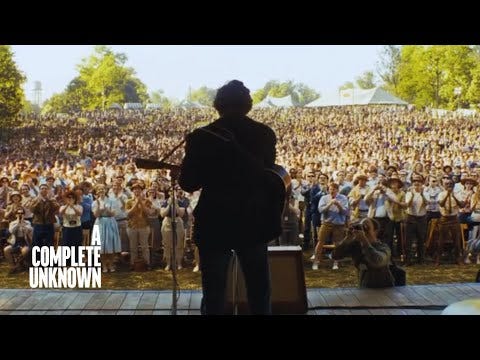Luke 19:28-40 | EnterTheBible.org
Palm Sunday | 04.13.2025
Context: Jesus enters Jerusalem surrounded by his disciples and crowds shouting in triumph and adoration. This is a story often recounted on Palm Sunday, the Sunday before Easter and the final Sunday of Lent, kicking off what is known as Holy Week and/or the Palm/Passion narrative. While the crowd is with him, Jesus is engaged with a group in the crowd who are none too pleased.
39 Some of the Pharisees in the crowd said to him, “Teacher, order your disciples to stop.” 40 He answered, “I tell you, if these were silent, the stones would shout out.”
A Complete Unknown | 2024
IMDb | Letterboxd | RRMC
Context: Folk singer Bob Dylan (Timothée Chalamet) invents and reinvents himself again and again. While this has been appreciated by many, including the Newport Folk Music Festival organizers, now they attempt to compel him to not go electric for his 1965 festival appearance, or at least to turn it down. Unsure what to do, Dylan sulks and smokes backstage. He bumps into his contemporary, his penpal, his friend, Johnny Cash (Boyd Holbrook) who once again gives him advice:
Johnny Cash: You playing tonight?
Bob Dylan: Yeah, that’s what the program says, but I’m not sure they wanna hear what I wanna play, Johnny.
Johnny Cash: Who’s ‘they’?!
Bob Dylan: Uh, you know, the men who decide what folk music is.
Johnny Cash: Well, fuck them. I wanna hear it. Make some noise, BD. Track some mud on the carpet.
Commentary:
I’m not comparing Bob Dylan to Jesus. But there is something about these moments between two influential men, a sweeping crowd, and would-be authorities that makes me wonder.
While the gospel passages depicting Jesus’s triumphant entry into Jerusalem come up every year in the church calendar, I think there’s always something new to think about. This year, I’m struck especially by this brief moment between Jesus and a group of Pharisees. They tell him to tell his disciples to stop. They don’t like what they’re seeing and want the person who incited the crowd to stop it.
Really, it’s stronger than that. They tell him to order them to stop, to command them. The Greek word here is ἐπιτίμησον (epitimēson), which is to rebuke, to charge, to admonish. They want him to get angry at the crowd - as angry as they are - and tell them off for how wrong they are to cheer for him the way they are. Make them be like us: angry at you!
When I write “the tell him,” really it’s stronger than that, too. Turning to the Greek, the writer puts it, εἶπαν πρὸς,” which is telling someone what to do with bite. εἶπαν (eipan) is to speak to someone with command, while πρὸς (pros) is simply “to,” yet at least one source says this is a strengthened form of the word, so it’s also directive now that it’s coupled with εἶπαν. In short, the Pharisees admonish Jesus to admonish his followers.
It’s a move that’s both hypocritical and uncritical. Hypocritical, in that the Pharisees refuse to see how the way they push religious practice may in part inspire this crowd-sized critique. And uncritical, in that to them it’s not about the systems that need change or the practices that need change or the bigger picture that needs change to align with God’s vision. No, it’s just that Jesus guy. He’s to blame.
There’s always someone to blame, huh.
Commentary:
Bob Dylan spends the entirety of A Complete Unknown inventing and reinventing himself. Never satisfied with whatever status quo he has moved himself into, he is ready for the next thing. His presence at the Newport Folk Music Festival blew the doors wide open for a greater appreciation of that music to a wider crowd. You can see this in the film when he sings “The Times They Are A-Changin’.”
A few years later, the times are a-changin’ again and the festival organizers and the crowd overwhelmingly do not want him to plug in his electric guitar and go loud.
He’s asked to turn it down. If he’s going to play noise. If he’d like Dick Clark to introduce him. When told there’s a lot of people here expecting music a certain way, Dylan claps back: “I’d rather have 10 faithful than 10,000 groupies!”
Producer Alan Lomax (Norbert Leo Butz) asks him, “Do you even remember folk music, Bob?” He responds, “No, what’s that? Maybe you could sing me something.” He says this because he knows Alan can’t. And won’t.
Jesus claps back at the Pharisees: “I tell you, if these (the crowds) were silent, the stones would shout.” He says this because he knows they can’t stop them. And won’t.
This is a turning point in the life of Jesus. He enters the city and also the endgame now. Everything he does from this point forth is now on full display to both those who support him and those who do not - and those who support him now and won’t later. The crowds, as we’ll see too, are fickle. Dylan experienced something similar with folk music crowds. He’s decidedly telling the folk music world that he’s not going to keep doing things the same way; he’s going to keep moving forward. In both cases, we see many people either embrace or stand firm against what these two men do.
Ultimately, Jesus was right.
And yeah, so was Bob Dylan.
In an era where authorities find someone to blame instead of change their own system, and an era where those who push forward for reinvention find themselves in real danger, these two stories have an unfortunate prescience.
In the name of God’s love, the crowds of peace and justice must shout. And so shall the stones! Change continues to come, as innocence is lost and compassion expands.
You know. Like a rolling stone!
What exactly happened on that fateful day in Jerusalem? We have gospel accounts and a couple thousand years worth of wonder. As for what happened on July 25, 1965, we have footage and eyewitness accounts. Did things unfold as depicted in A Complete Unknown? Listen and watch for yourself…
Thanks for reading, sharing, and subscribing. God’s peace and good movies to you!



